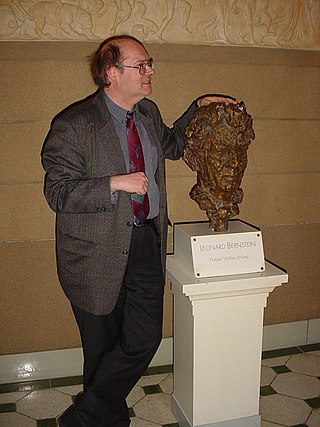Related Research Articles
Since the 18th century Berlin has been an influential musical center in Germany and Europe. First as an important trading city in the Hanseatic League, then as the capital of the electorate of Brandenburg and the Prussian Kingdom, later on as one of the biggest cities in Germany it fostered an influential music culture that remains vital until today. Berlin can be regarded as the breeding ground for the powerful choir movement that played such an important role in the broad socialization of music in Germany during the 19th century.
Norbert Angermann is a German historian.
Imanuel Geiss was a German historian.
Franz Herre is a German biographer, historian and journalist.
Christoph-Hellmut Mahling was a German musicologist and lecturer at various universities.
Egon Voss is a German musicologist, who is particularly known for his contributions to Richard Wagner research.
Ursula Kramer is a German musicologist. She has taught at the University of Mainz since 2001, as a professor from 2007. She has been president of the Christoph-Graupner-Gesellschaft from 2007.
Klaus Hortschansky was a German musicologist.
Dietrich Kämper is a German musicologist.
Emil Platen is a German musicologist and conductor.
Theodor Kroyer was a German musicologist.
Sieghard Brandenburg was a German musicologist, who stood out especially as a Beethoven researcher.
Wolfgang Auhagen is a German musicologist.
Tiburtius Tibor Kneif was a German-Hungarian lawyer and musicologist.
Theodor Friedrich Wilhelm Willi Kahl was a German musicologist.
Frank-Rutger Hausmann is a German Romanist and historian.
Hans Schmidt was a German musicologist.

Friedrich von der Leyen was a German philologist who specialized in Germanic studies.
Günter Fleischhauer was a German musicologist.

Dietmar Hiller is a German musicologist, organist, dramaturg at the Konzerthaus Berlin and docent at the Hochschule für Musik "Hanns Eisler" Berlin.
References
- ↑ Untersuchungen zur Melodik des Hugenottenpsalters on GoogleBooks
- ↑ Studien zur Geschichte der Aufführungspraxis Alter Musik. Ein Überblick vom Beginn des 19. Jahrhunderts bis zum Zweiten Weltkrieg on GoogleBooks
- ↑ Musik als Bild: allegorische 'Verbildlichungen' im 17. Jahrhundert on GoogleBooks
- ↑ Die Wiederkehr des Vergangenen